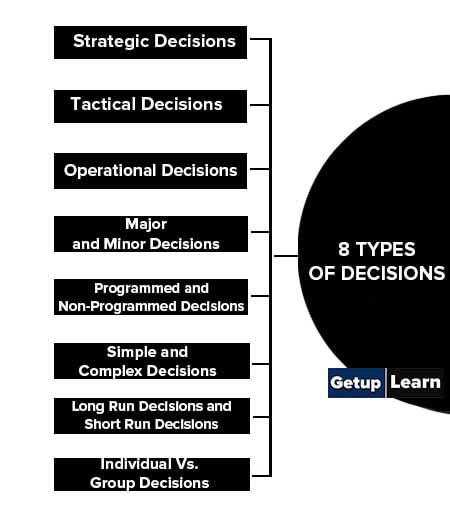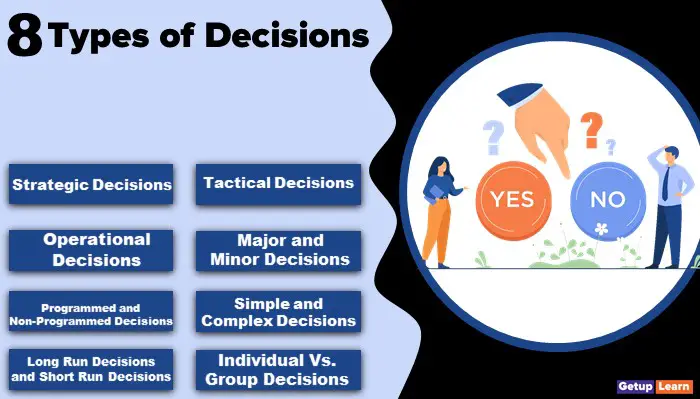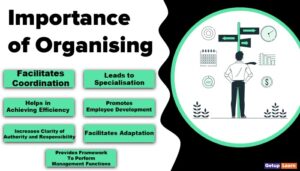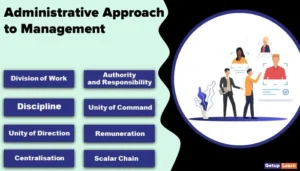Table of Contents
Types of Decisions
Decisions have been classified by various authorities in various ways. The main types of decisions are as follows:
- Strategic Decisions
- Tactical Decisions
- Operational Decisions
- Major and Minor Decisions
- Programmed and Non-Programmed Decisions
- Simple and Complex Decisions
- Long Run Decisions and Short Run Decisions
- Individual Vs. Group Decisions

Strategic Decisions
Strategic decisions are important and affect objectives, organizational goals, and other important policy matters. These decisions affect the whole organization or a major part of it.
Any strategic decisions are non-repetitive in nature and need careful analysis and evaluation of many alternatives. They are often complex and multidimensional. Strategic decisions involve large sums of money, has a long-term impact, and are usually taken by senior management.
Tactical Decisions
Tactical decisions are about how to manage performance to achieve the strategy. They are in clear boundaries. They may involve significant resources, have medium-term implications, and be taken by middle-level managers.
Operational Decisions
Operational decisions are decisions related to routine activities that follow the rules of the organization. These decisions are supportive in nature and need less analysis and concentration.
They do not change or guide the direction of the organization. Operational decisions need fewer resources, and short-term applications and are taken by first-line managers.
Major and Minor Decisions
Another name for major decisions is important decisions. They affect the whole organization and all various departments of the organization and are not repetitive in nature.
Minor decisions are unimportant decisions. Normally affect concerned departments only and is taken by the lower level of management.
Programmed and Non-Programmed Decisions
Decisions based on the company’s budget or policy etc. are programmed decisions. They are made in response to repetitive or routine problems and situations. For Example: Pay the money back for the wrong delivery procedure and the policy will decide it is a programmed decision.
Non- repetitive, peculiar, complex, most important, and unstructured problem decisions are non-programmed decisions. Downsizing the organization or shutting down one office or branch are non-programmed decisions. They do not occur again and again in the organization.
Simple and Complex Decisions
When a very less number of factors are going to affect the decision, it is called a simple decision. For Example: sanctioning leave to an employee for a long time with family, may consider how much work is there at that time and who will manage it will be a simple decision.
When many variables affect the decisions, like the growth of population, cost of living, and market growth is known as a complex decision.
If like the company is planning to increase the wages of workers, it will be affected by employee productivity, trade union influence, government policy, etc, then it’s a complex decision.
Long Run Decisions and Short Run Decisions
Decisions that affect long-term plans and activities are called long-term decisions.
For Example: New product launches, New retail outlets, or joint ventures Decisions affect short-term plans, and activities are called short-term decisions.
For Example: Discount Sales, and sources of finance for working capital.
Individual Vs. Group Decisions
When an individual manager or employee take a decision is called an individual decision. These decisions are routine, simple, repetitive, and programming decisions.
When a group take a decision, it is called a group decision. For Example: team or committee decisions, non-programmed decisions, and complex and strategic decisions.
What are the 8 types of decisions?
The following are the 8 types of decisions:
1. Strategic Decisions
2. Tactical Decisions
3. Operational Decisions
4. Major and Minor Decisions
5. Programmed and Non-Programmed Decisions
6. Simple and Complex Decisions
7. Long Run Decisions and Short Run Decisions
8. Individual Vs. Group Decisions.













